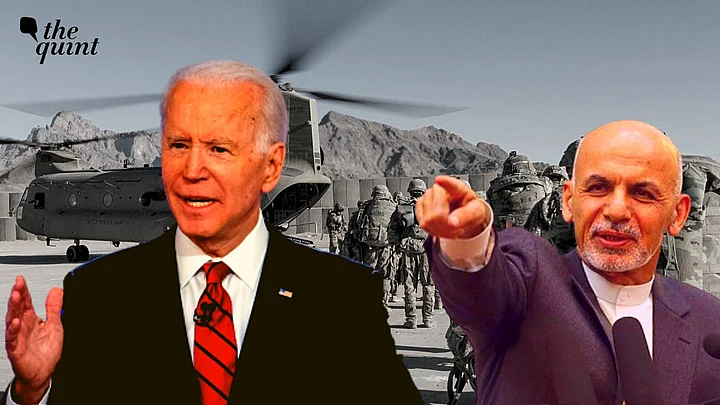United States President Joe Biden, as well as Afghanistan President Ashraf Ghani, appeared unaware of the immediate danger of a Taliban take-over, in their last phone call, on 23 July, as per a Reuters report.
“We are going to continue to fight hard, diplomatically, politically, economically, to make sure your government not only survives, but is sustained and grows.”Joe Biden to Ashraf Ghani
Days later, on 15 August, with Afghan forces rapidly retreating, the Taliban marched into Kabul. The Afghan President, shortly afterwards, fled the country.
Meanwhile, a transcript as well as the audio of the last Biden-Ghani phone call, has been accessed by Reuters. As per the news agency’s report, Biden had asked Ghani to work on Afghanistan government’s “perception” problem.
“I need not tell you the perception around the world and in parts of Afghanistan, I believe, is that things are not going well in terms of the fight against the Taliban."
Adding “whether it is true or not”, Biden had stated that “there is a need to project a different picture.”
He also told Ghani that the US will “continue to provide close air support, if we know what the plan is.”
A PLAN TO CHANGE PERCEPTION?
Biden suggested that if Afghanistan’s prominent political figures were to give a press conference together, backing a new military strategy, “that will change perception, and that will change an awful lot I think.”
The US president also suggested his Afghan counterpart to include former Afghan President Hamid Karzai in a press conference. Ghani, however, rejected the idea saying: “Karzai would not be helpful.:
Adding that Karzai is “contrary” and “time is of essence”, Ghani said that they have “tried for months with President Karzai.”
“Last time we met for 110 minutes; he was cursing me and he was accusing me of being a US lackey.”
Ashraf Ghani on Hamid Karzai
In response to this President Biden said: “I’m going to reserve judgment on that.”
AN APPROVAL FOR AFGHANISTAN GOVT'S STRATEGY
Biden also approved Afghanistan government’s promised shift in military strategy that would focus more on protecting “population centers” than in the fight to protect rural territories. He opined that doing so would not mere help on the ground, but also in the international “perception.”
“I’m not a military guy, so I’m not telling you what a plan should precisely look like, you’re going to get not only more help, but you’re going to get a perception that is going to change.”
Meanwhile Ghani told Biden that “his assurance of support goes a very long way to enable us, to really mobilize us in earnest.”
ANOTHER PHONE CALL
In a different phone call, General Mark Milley, US government’s chairman of the Joint Chiefs of Staff, too reportedly spoke to Ghani, about the global perception of events in Afghanistan and said: “the perception in the United States, in Europe and the media sort of thing is a narrative of Taliban momentum, and a narrative of Taliban victory. And we need to collectively demonstrate and try to turn that perception, that narrative around.”
General Frank McKenzie, who too was present, along with Biden’s National Security Advisor Jake Sullivan, in this phone call said: “I do not believe time is our friend here. We need to move quickly,”
US EXIT FROM AFGHANISTAN
The last of US troops took off from Afghanistan on Tuesday, 31 August, ending the 20-year war in the country.
Addressing the media from the Kabul airport on Tuesday, Taliban spokesperson Zabihullah Mujahid said, “We do not have any doubt that the Islamic Emirate of Afghanistan is a free and sovereign nation. America has been defeated… and on behalf of my nation, we want to have good relations with the rest of the world,” Al Jazeera reported.
(With inputs from Reuters)
(At The Quint, we question everything. Play an active role in shaping our journalism by becoming a member today.)
